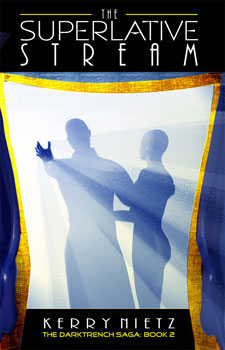‘The Superlative Stream’: Same Song, New ‘Verse
Some novels start like high-concept spacecraft. They launch into orbit with stars gleaming off their polished alloyed surfaces. Then, perhaps because of software failure to convert between metric and English measurements, they plummet to the ground.
 I am glad to assure readers that The Superlative Stream, DarkTrench Saga novel 2, isn’t one.
I am glad to assure readers that The Superlative Stream, DarkTrench Saga novel 2, isn’t one.
Still, at first I could have used a disclaimer for the second installment in Kerry Nietz’s sci-fi series, set in a world ruled by sharia law. In this novel, I almost missed that world. It was so well-crafted, genuinely gritty, and spiritually fascinating that I didn’t want to leave. Perhaps I was also drawn by the anticipation of two recent converts to grace returning to a radical Islam-ruled planet as missionaries. What challenges would come? How would God work?
Nietz knew better, methinks. Instead he seems to have determined what would be the most challenging opposite-world to which young debuggers Sandfly and HardCandy now travel.
What happens when you’ve recently had all your technical, mental behavior-manipulating “stops” miraculously removed by a mysterious can’t-stop-the-signal from space? What if you left your planet, using a futuristic-even-for-the-future spacecraft, to seek the source of that signal, the titular superlative stream? And what if you found another world whose near-magical society is based not on fear, rank, and religious rules, but total freedom?
1. Hero and plot. At first, the teenage technical prodigy Sandfly’s quest is simple: find the source of the superlative stream, which apparently originates from the Betelgeuse star system. As in A Star Curiously Singing, I found Sandfly a great hero to follow and cheer for.
New in this novel are first-person jumps into HardCandy’s perspective, using flashbacks that aren’t merely based on authorial omniscience but have an in-plot explanation: she is sharing her past with Sandfly as the two get to know each other. HardCandy’s backstory is the most poignant of the novel and strengthened my sympathy. What tragedies strike a girl in a culture that fears almost everything about the human body, especially a woman’s? Alas, much of this isn’t fiction. Here we must “credit” the sad and sick imaginations of real men.
Yet the story likely shines most when the author experiments beyond real-world parallels — which as I noted before never once smacks of naked political or religious motivations.
2. People and enemies. Back on the more-fun front, I quickly grew to love the series’ new titular character, the AI-equipped starship DarkTrench himself. He is the guardian we don’t see, yet enjoy interacting with, and who also turns up just when needed (and for me, at a legitimately unexpected moment). With the first novel’s necessary but sad loss of a certain sympathetic and nearly spiritually regenerate robot, DarkTrench is a great replacement.
Still, the ship’s programmed yet genuine care for its passengers is not able to keep the two humans from exploring a strange new world, one that at times does seem to borrow or pay tribute to the Star Trek planet-of-the-week. TOS viewers know the one: the planet where a completely unified culture seems to have conquered social unrest, suffering, disease and even death, and have a perfect society until the Something Happens to show that, gasp, things aren’t so perfect after all. Powerful entity woos short-skirted ensign. Captain Kirk fights someone and rolls in the studio sand. Pink sky and wheedling sound ambiance.
Ah, but didn’t the fans keep watching? So it is here, especially when the author seems to know this society is a tribute to classic sci-fi. In Superlative, readers may think the aliens — or angels? djinn? demons? — are up to no good. But Sandfly doesn’t, and legitimately so.
3. Story-world and style. Especially when separated from the futuristic WiFi-like “stream” connecting him to almost all machines, Sandfly is an excellent observer of the world he and HardCandy encounter. I can close my eyes and picture that world’s settings, on the planet’s surface and otherwise. Deep forest greens and sparkling, jewel-like interiors. Where Earth was all dust, metals, and rust, this world shines and dazzles. And what now seems to me like magic never seems so in the story. You begin wishing you were there; that it was right.
Only in the story’s latter third do things seem more confusing, especially with characters’ new motives. Revealing the reason here would be a spoiler. But I can say there is a reason.
Summary. The Superlative Stream is very different in tone and setting from A Star Curiously Singing. Therein lies its strengths. If the story has any weakness, it is slight confusion. I kept wondering, what hath all this to do with Earth and the DarkTrench crew’s ultimate mission? Still, the author’s invisible hand, like DarkTrench itself, glides past any glitches, bringing readers smoothly through more than one world desperately in need of Singing.





























Share your fantastical thoughts.